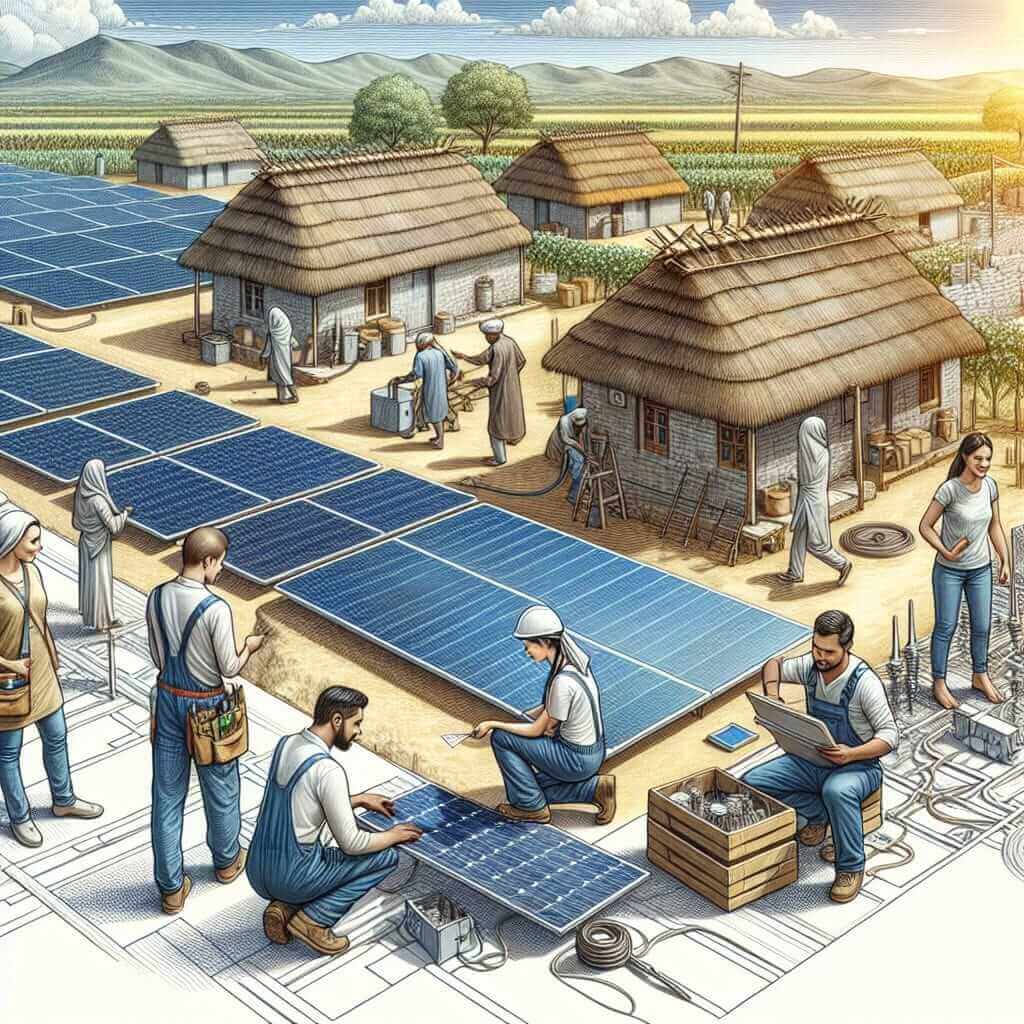The IELTS Reading section tests a wide range of skills, including reading for gist, reading for main ideas, reading for detail, skimming, understanding logical argument, and recognizing writers’ opinions, attitudes, and purpose. One topic that has appeared increasingly in IELTS reading passages is the “Impact of renewable energy on rural communities.” This topic continues to gain relevance as global awareness of sustainable practices grows.
In this article, we will explore how renewable energy impacts rural communities. We will provide a complete IELTS reading practice passage, questions from various formats, answer keys, and detailed explanations.
Reading Passage: Impact of Renewable Energy on Rural Communities
Passage
Renewable energy sources, such as solar, wind, and biomass, are transforming rural communities around the world. These energy sources not only promote environmental sustainability but also have profound socio-economic impacts.
Firstly, renewable energy helps reduce energy poverty. Many rural areas lack access to a reliable electricity supply. Renewable energy solutions, especially solar power, provide these communities with a dependable source of energy. This can power homes, schools, and health facilities, greatly improving the quality of life and community well-being.
Secondly, the development of renewable energy industries creates job opportunities. Wind farms and solar plants require maintenance, installation, and operational personnel, fostering local employment. For example, in India, solar panel installation has become a significant source of employment in rural areas, providing jobs and training for local labor.

Moreover, with the introduction of renewable energy, rural areas gain better access to clean water through solar-powered pumps. This access leads to improved health and agricultural productivity. Furthermore, renewable energy reduces the dependency on fossil fuels, which are often expensive and environmentally damaging.
In addition to the direct benefits, renewable energy projects often include infrastructure investments such as roads and schools, enhancing overall community development. Social equity also improves as marginalized communities gain access to sufficient energy resources.
On the flip side, there can be challenges associated with the implementation of renewable energy in rural areas. Initial investment costs can be high, and without adequate funding or government support, these projects may not be sustainable. Additionally, there can be reluctance or resistance from locals due to a lack of awareness or understanding of the benefits.
In conclusion, while renewable energy transforms rural communities by providing reliable energy solutions and economic opportunities, addressing challenges such as upfront costs and public awareness is crucial to ensuring sustainable and equitable development.
Questions
Question Type 1: Multiple Choice
-
According to the passage, what is one of the primary benefits of renewable energy in rural communities?
A. Increased urban migration
B. Energy poverty reduction
C. Higher fossil fuel consumption
D. Industrial pollution -
What is a major employment opportunity created by renewable energy in rural areas?
A. Urban planning
B. Fossil fuel extraction
C. Solar panel installation
D. Automobile manufacturing
Question Type 2: True/False/Not Given
-
Renewable energy always leads to the displacement of local communities.
A. True
B. False
C. Not Given -
The passage suggests that one challenge for renewable energy projects is obtaining government support.
A. True
B. False
C. Not Given
Question Type 3: Matching Information
Match each statement with the correct paragraph (A-F).
- “Renewable energy decreases reliance on fossil fuels.”
- “Access to clean water is improved through renewable energy.”
Question Type 4: Summary Completion
Complete the summary using the list of words, A-G, below.
Renewable energy impacts rural communities by providing (7) energy solutions, improving quality of life, creating local (8), and offering better access to clean ___(9).
A. Water
B. Employment
C. Hospitals
D. Education
E. Reliable
F. Expensive
G. Transportation
Answer Keys and Explanations
- B (Energy poverty reduction): The passage mentions that renewable energy helps reduce energy poverty by providing reliable energy to rural areas.
- C (Solar panel installation): The passage states that solar panel installation has become a source of employment in rural areas.
- B (False): The passage does not mention displacement of local communities; rather, it highlights benefits and challenges.
- A (True): The passage mentions that without adequate funding or government support, renewable projects may not be sustainable.
- E (Paragraph 3): “renewable energy reduces the dependency on fossil fuels…”
- D (Paragraph 3): Renewable energy helps rural areas gain better access to clean water through solar-powered pumps.
- E (Reliable)
- B (Employment)
- A (Water)
Common Mistakes
- Misinterpreting the question by not paying attention to keywords like “always” or “major.”
- Failing to reference specific information from the passage leading to incorrect True/False/Not Given answers.
Vocabulary
- Socio-economic (adjective) /ˌsəʊ.si.əʊˈek.nɒm.ɪk/: related to society and economy.
- Sustainability (noun) /səˌsteɪ.nəˈbɪl.ɪ.ti/: maintaining ecological balance over time.
- Reliance (noun) /rɪˈlaɪ.əns/: dependence on something or someone.
- Upfront costs (noun phrase): initial expenses before returns are seen.
Grammar Focus
Non-finite Clauses
- Form: A clause containing a verb that does not show tense and is not the main verb in the sentence.
- Example: “Renewable energy promotes environmental sustainability by reducing fossil fuel use.”
Advice for High Reading Scores
- Practice skimming for main ideas.
- Identify keywords in questions and match them with information in the passage.
- Develop vocabulary specific to common IELTS topics.
- Regularly practice with authentic IELTS reading passages.
By incorporating these strategies and understanding the practical implications of renewable energy on rural communities, you can enhance your IELTS Reading skills. For more practice, you might find these articles useful The Impact of Renewable Energy on Rural Communities, and Impact of Renewable Energy on Job Creation.